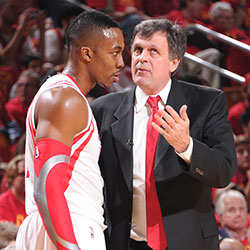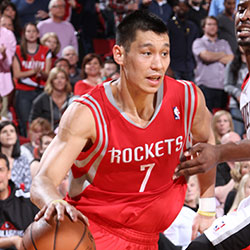Houston Rockets
Rockets face critical offseason
The loss to Portland was painful but also educational — the Rockets will have several key goals as they go into this offseason.
Published
11 years agoon
I needed to take the weekend off before writing anything, but I think Rockets broadcaster Bill Worrell summed up this series best.
“My heart is down on the floor right next to you. Please pick it up and massage it,” said Worrell to Clyde Drexler.
And that was 30 seconds before Damian Lillard hit that shot.
The final play of Game 6 was devastating, but it was a collective failure. While many have chosen to blame Chandler Parsons for not sticking with Lillard, that was only part of the problem. Initially, Kevin McHale rolled out Dwight Howard on the inbounder, placing James Harden on LaMarcus Aldridge and playing Jeremy Lin. When he realized the issues, he called a 20-second timeout to take out Lin, get Terrence Jones on the inbounder and put Dwight on Aldridge.
Howard said that all the team talked about was stopping the three, but not only did the Rockets lose Portland’s best shooter, but take a look at Jones’ defense on the inbounder. He’s doing nothing but covering the pass down low to Aldridge, where Houston’s best defensive player is locked in. The Rockets left a Grand Canyon-sized hole at the top of the key with no resistance on the pass or the shooter.
Did that look at all like a team trying to stop a three-pointer?
But while the Rockets’ inability to stay with Lillard for less than a full second will haunt them this offseason, it’s only part of the nightmare.
The fourth quarter collapse in Game 1. The absurd call against Dwight Howard in overtime of Game 1. The brain lapse in not calling timeout and then turning it over in Game 4. And now the infamous Game 6.
The Rockets honestly blew three games in this series because of the little things. Correcting any one of these simple mistakes likely puts them in the second round of the playoffs against a team (San Antonio) that they swept in the regular season, and that’s what really should stick with them.
The Rockets are top-heavy in talent, but it should be sobering to all of us that not only did the Rockets lose with home court advantage in this series, but Portland was likely the very best possible matchup out there. There are no easy outs in the West and the Rockets have not yet separated themselves, so this will be a very important offseason for this team. They can’t afford to just stay pat.
Here’s what I think you can expect.
Rockets Need Coaching Help
There’s no doubt about it, Kevin McHale looked lost at times in this series. He didn’t make series-altering adjustments until Game 3. His team seemed unprepared in big moments. Ultimately, the Rockets underachieved and fell short of expectations.
But while I thought it was premature to come out so early with a vote of confidence for McHale, there may be a method to the madness in keeping him for the final season (team option) of his contract.
Remember, Dwight Howard was specific in saying that McHale was a big draw for him to sign with Houston. He is well-liked by his players and respected by many around the league. For example, he both drafted and coached Kevin Love, someone who could be traded between now and the summer of 2015, when he’s a free agent. This next year gives McHale one more season to both lure talent and prove he is the right man for the job long-term.
But the Rockets absolutely must hire an experienced, savvy, defensive-minded assistant, preferably one with head coaching experience. McHale can still serve as figurehead and team leader, but they could use X’s and O’s help on the defensive side after losing Kelvin Sampson. This is a must this offseason.
Big Game Hunting
The Rockets will not have near-max cap room until 2015, but I can promise you that they will operate this offseason as if they have it now.
They will pursue Carmelo Anthony. They will watch to see if Chris Bosh opts out. Dirk Nowitzki will be a free agent, though it’s incredibly unlikely he would leave Dallas (much less for a rival city like Houston). They will pursue a trade for Kevin Love. Paul Millsap provides the best of both worlds — an upgrade at the power forward position and a player that expires in 2015.
Rockets general manager Daryl Morey is on record as saying the Rockets lack a third-best player on a championship team. Until he acquires that player, the Rockets can not sign any role players to long-term deals beyond the league minimum salary because it will hurt their flexibility to acquire that key piece by 2015.
With his hands tied under those restrictions, take a look at the team’s transactions this season: Omri Casspi, Francisco Garcia, Ronnie Brewer and Jordan Hamilton were all out of the rotation by the end of the season. They weren’t able to move Greg Smith for anything. It wasn’t until very late in the year that they were able to find a rotation player with a league minimum deal (Troy Daniels).
They need to finalize their core so they can go over the cap and into luxury tax (if they so choose) to get the right pieces. Hands down, getting their third-best player is the top priority this offseason.
Trading Jeremy Lin and Omer Asik
Omer Asik didn’t speak to the media on Monday (par for the course), though I did see him exit the building. Lin said it’s “part of the business.”
“I’m human. I definitely wonder about it,” said Lin of the thought that he will be traded this summer. “Next year will be my fifth season. My first year and a half, I dealt with my name being surrounded with getting cut. And from then on, my name being surrounded with trades. I’d rather take the second than the first.”
Here’s why I think we’ve seen Lin and Asik’s final games with the Rockets.
- The Rockets will be paying a hair under $30 million to a pair of backup players. I repeat — thirty mill. Backups. Even at a cap hit of $17 million, it’s a terrible allocation of cap space and funds.
- Asik is a luxury the Rockets can’t afford. Lin is a less-than-ideal fit on a team that would place more of a premium on sure-handedness, three-point shooting and defense at the position. He could do a lot more on a team with lower expectations that gave him carte blanche to operate and develop — much like the Rockets expected to be when they signed him.
- As mentioned before, Morey can’t sign anyone of significance until their foundation is set. Are they really going to use up another year of Dwight’s prime before making the move for the third guy? Getting a third guy means dealing Asik and/or Lin.
- It would have been irresponsible to trade Lin and Asik for nothing at this past February trade deadline given that they were in the middle of an important season. The Rockets were shopping those players looking for a big name star (unlikely) or for players that could help them this season without hurting their flexibility beyond 2015 (difficult). That concern does not exist this summer. They simply need to unload them off the books, knowing that the cap room itself is now a significant asset to work with.
- The Rockets will try to prepare several trade options they can turn to when the need for cap room arises. The Rockets can likely move Asik given that he is a rare commodity, but Lin for “nothing” (pure cap room) will cost the Rockets additional assets and will be harder to execute.
I would be shocked if either player is still with the team by training camp in September.
WANTED: Three-and-D
The three-point game is critical to the Rockets. They led the league in attempts per game (26.6), but were only mediocre in efficiency (35.8%, #16 in the league). In the playoffs, the Rockets shot 31.8% from three. Take out Troy Daniels? 29.5%.
That’s an absurdly low rate given how much they depend on the three. Players who stretch the floor and can knock down a three-pointer when defenses double Dwight or collapse on Harden drives are essential.
Defensive players, especially on the perimeter, are another must. The Rockets have one top defensive player (Patrick Beverley) that isn’t a center. Corey Brewer (COREY BREWER!) popped off for 51 on this team. They need a player or two with some length, athleticism and a defensive motor.
So when it comes to role players, three-point shooting and defensive specialists should be high priorities this offseason.
What we saw from James Harden
Last but not least, I want to talk about James Harden.
The Rockets’ star guard was brilliant in Game 6, but it was five games too late in this series. The defense played by Wesley Matthews and Nic Batum played a role in slowing Harden, but there are far better defenders in the West, and that wasn’t the whole story. There were times he looked completely out of it and was unable or unwilling to attack the basket. His inability to stay focused on the defensive end has been a major problem since he’s been here. The team needs to get him some help, yes, but as the best player on the team, the Rockets will only go as far as Harden will lead them.
It’s no secret that Harden is immature, as evidenced by his dustup with a reporter after Game 2. It’s a byproduct of being that young and that talented. If anything good comes from this series, let it be that James Harden learns and grows from it, that he takes it personally and becomes a better professional next season.
Les Alexander can’t buy this change. Daryl Morey can’t acquire it. Kevin McHale can’t coach it. It’s up to James.
Armed with a bizarre fascination for Mario Elie and a deep love of the Houston Rockets, Dave Hardisty started ClutchFans in 1996 under the pen name “Clutch”.

You may like
Houston Rockets
Looking Back on the Trade for Phoenix’s Draft Picks
Are the Rockets set to cash in on Phoenix’s downfall or could a Suns retool murky the waters?
Published
1 month agoon
March 12, 2025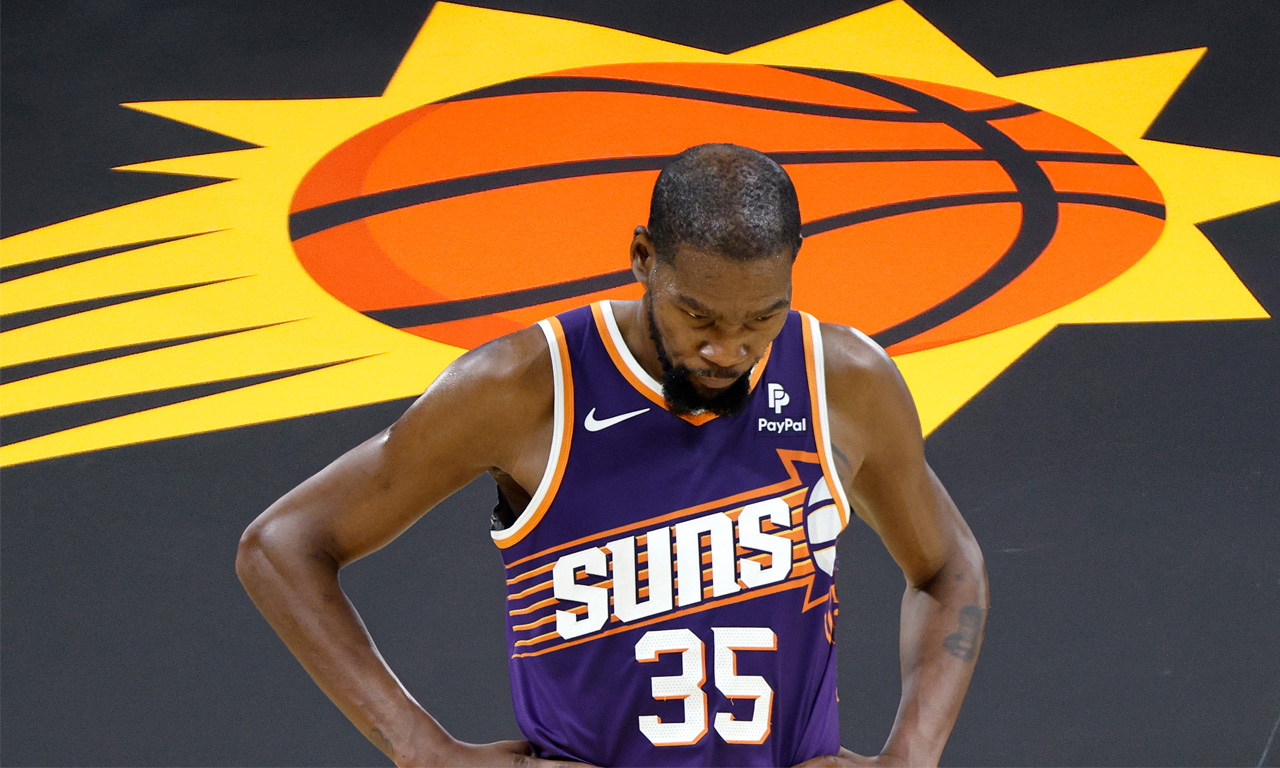
As the Houston Rockets set to host the Phoenix Suns tonight, it seems the right time to take a look back at the trade that linked these two franchises together for the foreseeable future.
This past June, the Rockets made a trade with Brooklyn that sent back to the Nets control of their 2025 and 2026 unprotected first-round picks. In exchange, the Rockets received a large chunk of Phoenix’s future (2025, 2027, 2029) and control of the Dallas Mavericks’ 2029 first.
In essence, the Rockets traded one pick and one swap for two picks and two swaps. All unprotected.
Thoughts At The Time of the Trade
If I’m going to discuss the current outlook of this trade, I have to be honest about how I saw it at the time of the move. While I didn’t hate this trade initially, I definitely didn’t love it either.
I liked that the Rockets increased their overall trade assets. I also liked that they extended the timeline to be able to make a bigger trade and I also appreciated that they kept control of the 2027 Brooklyn swap.
But I didn’t like that the Rockets gave up what seemed like the more established value (Brooklyn) for a more uncertain gamble (Phoenix). The Rockets did not control a “tanking runway” of picks to offer back to Phoenix — all of the picks Houston got in the deal were in staggered years (’25, ’27, ’29). I also felt Brooklyn, who badly needed to rebuild, got away with paying market value to get their picks back despite the fact that the Rockets invested years in watching those picks appreciate up to the point that they had the Nets completely over a barrel.
Net-net: I felt like more certainty was traded for less certainty and it was more of an equitable trade for both teams rather than Brooklyn paying dearly to get back the things only the Rockets could offer.
There were two ways I thought this trade could pay dividends: The Suns needed to flame out immediately, as in this season (unlikely), or the Rockets could trade all those pick assets as part of a deal for a real superstar in the next 12-18 months (more likely).
In a testament to how quickly change can occur in a very unpredictable NBA, four things have happened that have been positive indicators for the Rockets in making this move.
The Suns are fading
While Phoenix had major salary cap issues, dealing with the second apron, they didn’t appear to have problems on the court. They jumped out of the gate 8-1 and looked like a legitimate contender behind their star trio of scorers in Kevin Durant, Devin Booker and Bradley Beal.
Given Houston controlled Phoenix’s pick this year via a swap, it looked like the Rockets would come up empty-handed on the trade this season.
That changed quickly.
Injuries, serious depth concerns and a lack of a defensive identity has sent Phoenix spiraling. Booker’s availability has been inconsistent, forcing Durant to carry the load, while Beal has not quite fit in at all. Their financial limitations, thanks to owner Mat Ishbia’s all-in spending spree, have handcuffed their ability to improve the roster around the three stars.
The Suns are sitting 11th in the West, having gone 22-34 since that hot start, and are currently trying to catch a depleted Dallas squad to get back into the play-in picture.
As of right now, the Rockets project to end up with a lottery pick (albeit a late one) this season out of the trade.
Phoenix was caught shopping Durant
Because the Suns struggled so hard after the start, they tried to make a major move at the deadline but could not unload Beal, in large part due to his no-trade clause.
As a result, they may have made a misstep: They openly tried to trade Durant, which inevitably became public news.
Now? Durant will almost assuredly be traded this summer — likely to a destination that he handpicks. This means the Phoenix Suns will have to look at all possibilities for their future, including potentially having to give Rafael Stone and the Rockets front office a call.
But keep in mind, the Rockets can not offer Phoenix the ability to completely rebuild via the draft right now. Phoenix’s 2026 pick is controlled by Washington. They would have to get extremely creative to set that stage. A retool in Phoenix is much more likely.
Could Brooklyn have been better than expected?
This one is tougher to gauge.
The Brooklyn Nets are currently tied for fifth-worst team in the league, giving them strong lottery odds this summer. This was expected. After all, the Nets, even with a healthy Mikal Bridges and a full roster, were not a good team last season, closing the year 20-41 in the final three quarters of the season. The Rockets ended up with the #3 pick (Reed Sheppard) as a result of Brooklyn’s mediocrity.
However, if the Rockets had not placed that pick back in Brooklyn’s hands, would the Nets be better than this?
Brooklyn brought in a new coach in Jordi Fernandez that has had a positive impact. They have dumped off players, such as Dennis Schroeder and Dorian Finney-Smith, that impacted winning. The bar to make the play-in in the East (.415 winning percentage) is obscenely low, with Brooklyn being just five wins away from it at the moment.
And on top of that, Brooklyn did have lots of draft capital that they could have moved to try to win now.
It’s very tough to say as you don’t know if a team with Bridges still in Brooklyn might have actually been worse than this current squad, but you could make a case that the pick the Rockets would have ended up with from Brooklyn this season would be eerily similar to the one they will end up getting from Phoenix this year.
Again, this is a tough call.
Nico Harrison Hooked the Rockets Up
As part of the trade, the Rockets got control of the Dallas Mavericks’ 2029 first-round pick (unprotected, of course). While there’s really no way of knowing what a pick will be five years out, we did know that Luka Doncic would be just 29-30 years old that season and it was fairly etched in stone that he would be the core piece of a Dallas squad that season.
Enter chaos in Dallas.
Doncic was shipped out in the trade that shocked the world, which could have a major impact on the Rockets. Dallas’ current core of Kyrie Irving and Anthony Davis will be 37 and 36 years old that season, respectively.
On paper, the value of that pick shot up.
Final Summary
Right now, the outlook on these picks looks strong. One source stated off the record that they feel the 2029 Phoenix pick is the best pick asset out there that is owned by another team. The Rockets would be reluctant to add that one specifically into any trade unless it’s for a truly legitimate star.
But if there is any lesson that the NBA teaches us over and over again, it’s that it’s very hard to predict where a team will be a year from now, much less three years from now.
Can the Rockets pressure Phoenix and leverage the ownership they have of their draft capital to get what they really want (Booker) from them? Could a Suns retool around Booker and Beal, with the right pieces and assets acquired from a Durant trade, significantly change their on-court outlook and cap sheet — which in turn could damage the value of the picks Houston controls?
Bottom line is it has worked out well this season, and the future forecast at the moment is promising. The current value of those future picks appears strong. What will likely determine history’s final grade for this trade will be how it sets them up for the trade to come, and that’s where fans will be looking to Stone and the front office for action starting this summer.
Houston Rockets
Amen Thompson’s ankle injury will be re-evaluated in one week
“The things he does you can’t replicate,” says Rockets coach Ime Udoka
Published
1 month agoon
March 10, 2025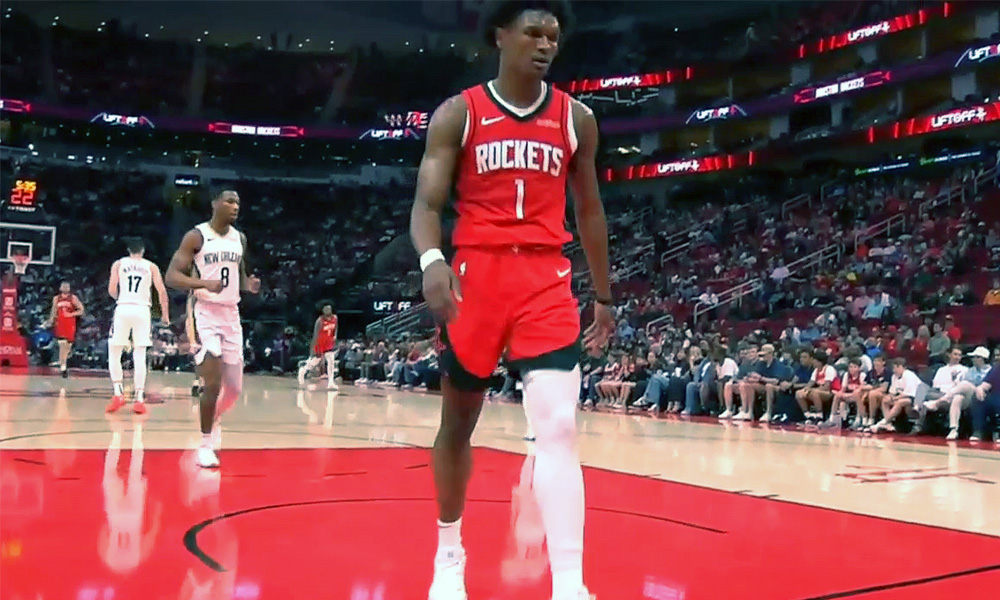
Rockets young star Amen Thompson will have his ankle injury re-evaluated in one week, according to Ime Udoka.
Thompson had an MRI on Sunday and the Rockets coach confirmed all imaging (X-ray, MRI) was negative.
“Just some swelling and pain, obviously,” said Udoka.
If you listen to Udoka, you can tell he knows how special Amen is to this team. He said the Rockets are missing a lot by not having him out there.
“Obviously, the things he does you can’t replicate,” said Udoka. “[Amen is] a guy that plays every position for us. When one goes down, he runs the point. If another is out, he runs the four.”
Amen is one of the best defensive players in the game, and as a one-on-one defender of guards/wings, he might already be the best in the league in just his second season. He’s holding his opponents to 40.5% shooting from the field, tops in the league.
“He’s a very unique defensive player,” said Udoka. “We got some guys that do some great things there, but I like to put him and Dillon on the best two usually, night to night. You got Tari and that’s a luxury as well, but the way he goes about it is different. His athleticism, size, speed, strength, shotblocking ability, steals… he’s all over the place.”
“Hard to replicate for sure.”
Amen injured his ankle late Saturday night in a blowout win against the Pelicans, but the unfortunate part was he probably should not have been on the floor in the first place.
The Rockets left Amen Thompson in the game in a blowout to get one more rebound for a triple-double and he just got injured. He's heading to the locker room with a limp. https://t.co/UBtrEpgWuU pic.twitter.com/D8GeKP8sQk
— ClutchFans (@clutchfans) March 9, 2025
The Rockets had built well over a 30-point lead by early fourth quarter. Jalen Green was able to rest the entire fourth. Alperen Sengun came out of the game with 7-8 minutes left while Dillon Brooks and Tari Eason came out with 6:00 left. But Thompson, who had posted an insane +39 on-off number, remained in the game because he was one rebound shy of a triple-double with 15 points, 11 assists and nine rebounds.
Udoka addressed that decision on Monday before the game against Orlando.
“What I typically don’t do is wholesale substitutions,” said Udoka of the decision to keep Amen in the game. “Albeit 30[-point lead] at six minutes [left] is different than losing to Minnesota, a 16-point lead with four minutes [left].”
“I’ve seen it go both ways in the past. You take out guys too early and have to bring starters back, and vice versa.”
Thompson has played in 60 games this season, five short of being eligible for postseason awards. He absolutely should be up for an All-Defensive nod this season so keep an eye on him getting back in time for that. He would need to return to action no later than April 4th for the game against the OKC Thunder in order to play enough games to be eligible.
Houston Rockets
How the Kyrie Irving Injury Impacts Rockets
Houston’s draft positioning and offseason plans could be impacted by Dallas
Published
1 month agoon
March 4, 2025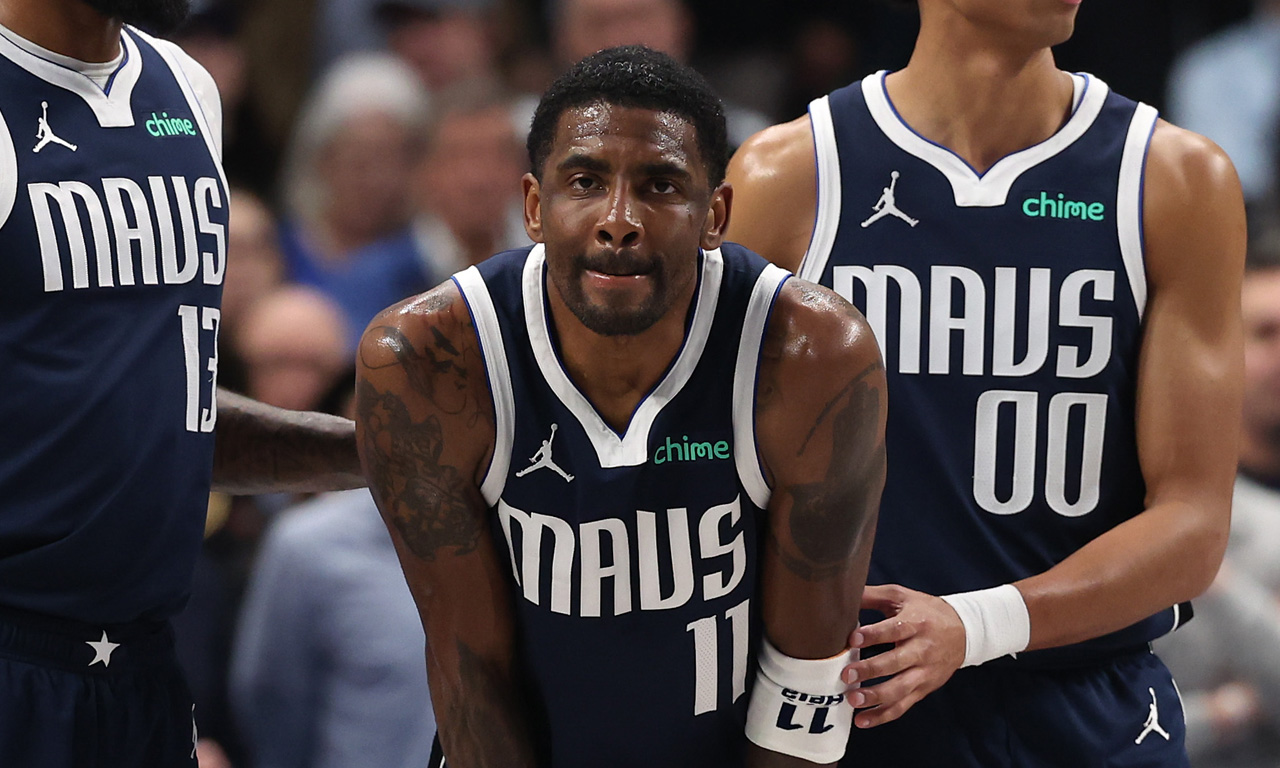
Dallas Mavericks guard Kyrie Irving was injured Monday night and the news dropped on Tuesday that the knee injury is serious — a torn ACL in his left knee that will end his season and a good portion of next season as well.
Brutal. I can’t think of an NBA team that imploded faster than the Dallas Mavericks.
You trade away a 25-year-old phenom who just hoisted you on his back en route to the NBA Finals a year ago. You cashed in that golden ticket to go all-in on a trio of aging stars in Kyrie, Anthony Davis, and Klay Thompson.
Bold strategy, Nico. Let’s see if it pays off.
(Narrator: It’s not paying off.)
The Mavericks had some interesting potential this year and maybe the next couple of years once everyone was healthy, but now? Their star guard is likely out until the calendar year 2026 and Klay and AD aren’t getting any younger nor more durable. The Mavericks may have actually swapped their future for a present that never arrives — and Dallas GM Nico Harrison has to be feeling overwhelming pressure right now.
So how does this impact the Rockets?
For starters, Houston has a game remaining on the schedule against Dallas on March 14th at Toyota Center — Davis may or may not be back for that game.
More importantly, Dallas is the 10th seed in the West at the moment, just 3.5 games ahead of the Phoenix Suns (11th seed). The Rockets control Phoenix’s first-round pick unprotected this season via a swap. We need as many West teams as possible ahead of Phoenix to keep them out of the play-in/playoffs and to push them as deep into the lotto as possible.
This complicates that. Phoenix’s remaining schedule is the toughest in the NBA by a good margin, with plenty of games left against the league’s best teams, so it still looks promising overall — but we’re talking about Kevin Durant, Devin Booker and Bradley Beal. They can still get hot at the right time while Dallas may struggle.
So keep a close eye on that. The good news is the Portland Trail Blazers are one of the hottest teams in the league and they are (shockingly) nipping at the Arizona squad’s heels.
Taking a look ahead to the offseason, the Kevin Durant Pursuit will be big.
This one is a little more complicated for Houston. The Rockets really want Devin Booker but, as of now, the Phoenix plan appears to be to trade KD this offseason and retool around Booker. The Rockets will have interest in Durant but they’re not going to sell the farm (prospects and all the picks) for a 37-year old like they would for Booker.
Three teams that I’ve heard a lot about from Rockets circles that will be in the mix are Houston, Minnesota and Dallas — Timberwolves and Mavericks have been considered the main competition. But, a lot of this will depend on Durant himself and where he wants to play at this stage of his career.
Keep in mind also, if the Suns are “retooling” around Booker and Beal (holding the no-trade clause), then they could be placing a higher priority on win-now players over the return of their own draft assets. The Rockets definitely have the best assets overall to offer up in any trade package between those three teams, but if Phoenix does prefer finding the right ready-to-win players around Booker/Beal, that gives Dallas and Minnesota a real chance.
This injury “may” take Dallas out of the equation, and they are/were definitely a contender for KD’s services given his past relationship with Kyrie and the way Dallas was positioned to win right now. Does KD at his age want to wait for Kyrie to be healthy?
And one last friendly reminder: The Rockets control that Dallas 2029 first (unprotected).
Houston Rockets
Rockets Sign David Roddy to Two-Way Contract
Former first-round pick has played with the Grizzlies, Suns and Hawks
Published
2 months agoon
March 3, 2025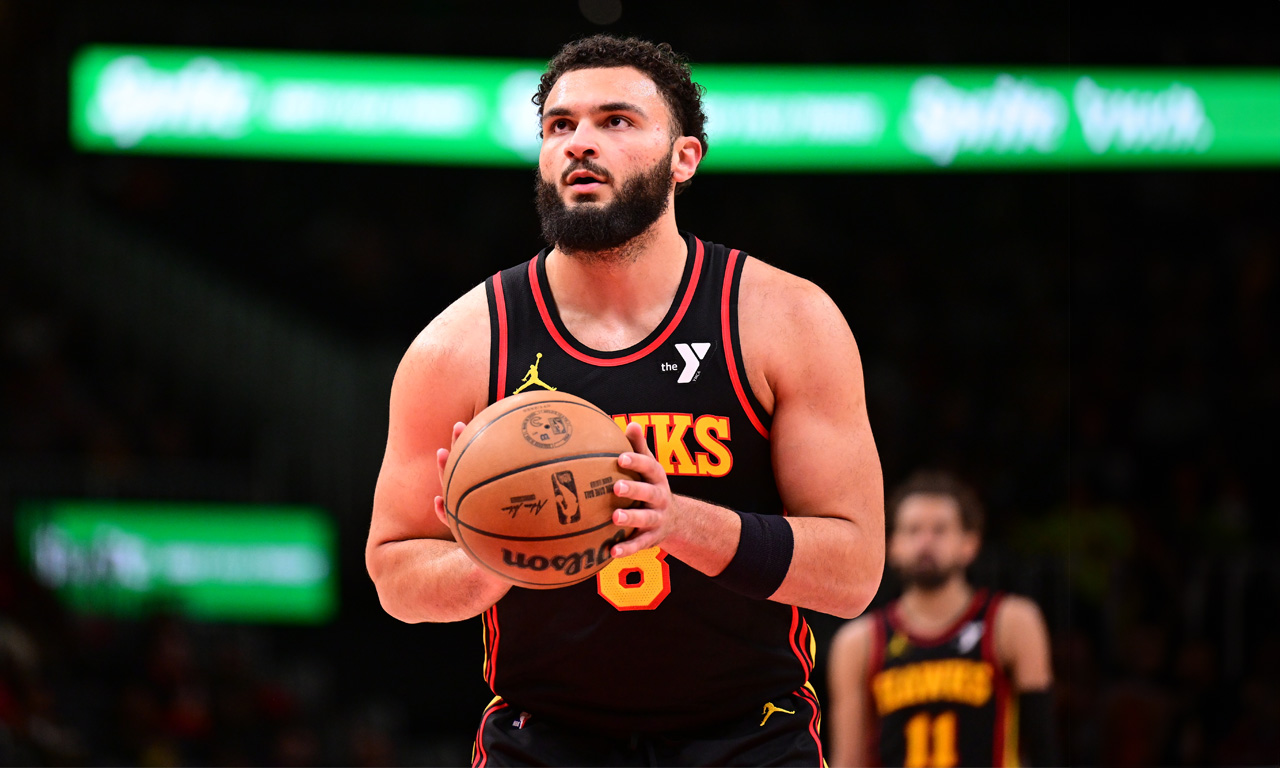
The Rockets made a move on Monday, signing former first-round pick David Roddy to a two-way contract.
The two-way spot opened up after the front office signed Jeenathan Williams to a standard four-year, $8.2 million contract (with friendly team options all along the way).
Roddy is 6-foot-5 and 250+ pounds but sports a 6-foot-11 wingspan. He was taken with the 23rd pick in the first round of the 2022 NBA Draft — six selections after the Rockets drafted Tari Eason. A standout in college, Roddy averaged 19.2 points, 7.5 rebounds, 2.9 assists, 1.2 steals, and 1.1 blocks per game during his junior season at Colorado State.
Roddy, who turns 24 later this month, is a physical player who can play multiple positions. He’s a solid rebounder for his size/position. He has played in 165 games over three seasons with the Grizzlies, Suns, Hawks and most recently Sixers, averaging 6.2 points and 2.9 rebounds per game.
The guard/forward has not shown efficient shooting, however — he’s a career 30.5% three-point shooter and just 68.4% from the line. His defense is better inside than out.
Ultimately, it will be those two things — three-point shooting and defense — that will determine his chances of carving out a consistent role in the league.
All in all, it’s a low-risk signing and the Rockets get a look at a prospect that fits their age timeline.
Houston Rockets
Houston a potential landing spot for Ben Simmons post-buyout?
Published
2 months agoon
February 6, 2025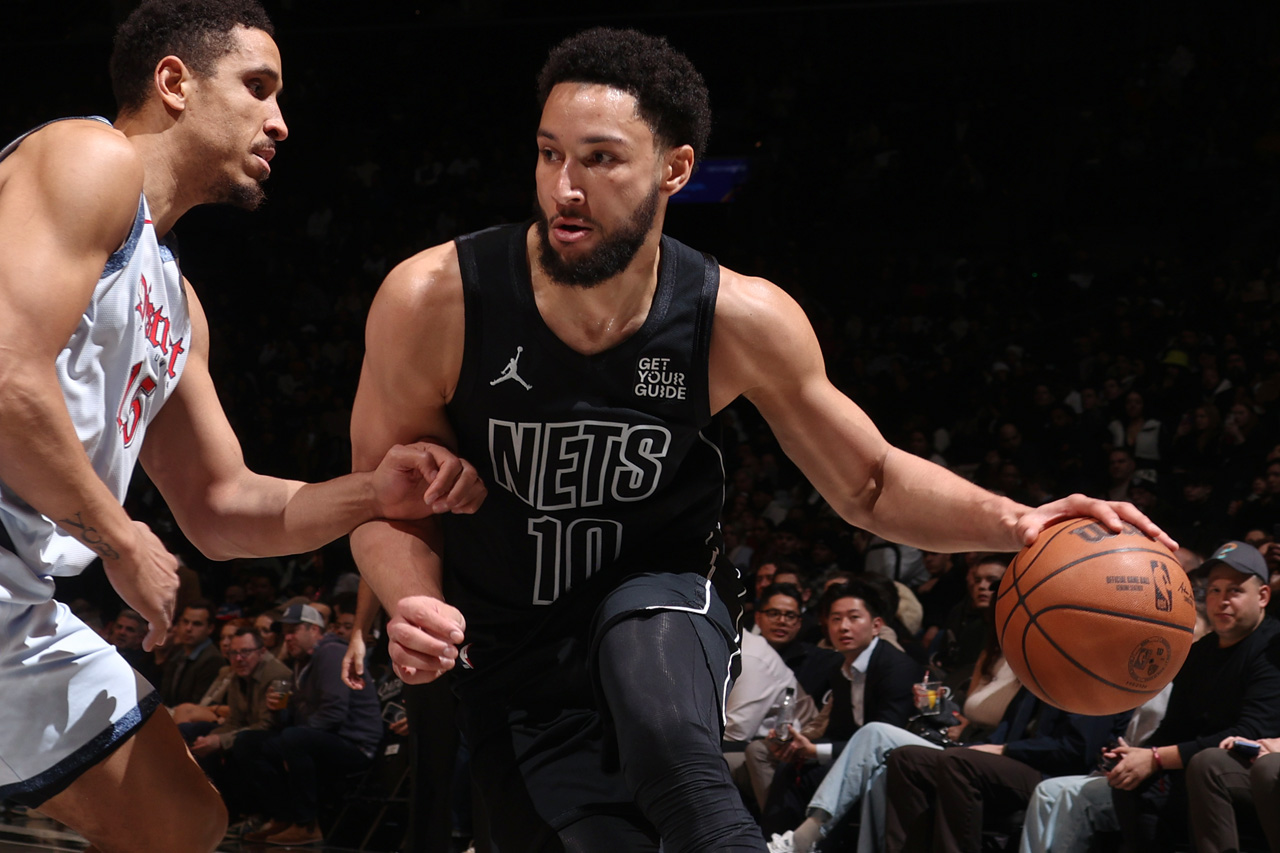
ESPN NBA analyst Brian Windhorst said on Thursday’s NBA Trade Deadline show that Brooklyn Nets forward Ben Simmons is working on a buyout and the Houston Rockets is a potential landing spot for him.
“Cleveland and Houston are two situations for Ben Simmons,” said Windhorst.
Brian Windhorst says the Cavaliers and Rockets are buyout locations for Ben Simmons.
Thoughts? pic.twitter.com/7ly4mvmxr5
— ClutchFans (@clutchfans) February 6, 2025
Advertisement
Rockets coach Ime Udoka was an assistant coach in Philadelphia in 2019-20 when Simmons was with the Sixers, before injuries took a significant toll. In fact, Udoka, when speaking about Amen Thompson earlier this season, brought up some comparisons to Simmons.
“The skill set is there, and it’s something that’s unique with his speed, athleticism, size, passing ability, and all those things,” said Udoka of Thompson. “I coached somebody, Ben Simmons, who had similar traits… as far as size and ability to push the pace, and find guys and finish. There are some similarities there.”
Both Thompson and Simmons are known for their elite athleticism, defensive versatility, and ability to create opportunities in transition.
However, can Simmons help the Rockets today? That’s the tough question.
Simmons has played in 33 games this season, averaging 6.2 points, 6.9 assists, 5.2 rebounds, 0.8 steals and 0.5 blocks in 25 minutes a night. He does not shoot threes (like, at all) — he has only attempted two threes in the past three seasons combined.
Ideally, he does not play in front of your young forwards of Amen, Tari Eason and Jabari Smith Jr. and on that basis alone, I think I would pass. But, Ime loves defensive dogs and he could use some extra ballhandling on the roster. You can see that there’s little in the way of offensive organization when Fred VanVleet is out.
There would be a comical full circle moment though if the Rockets did sign Ben Simmons, considering the Rockets were heavily criticized for trading James Harden in 2021 to Brooklyn instead of to Philadelphia for Simmons. The Rockets clearly made the right choice there.

